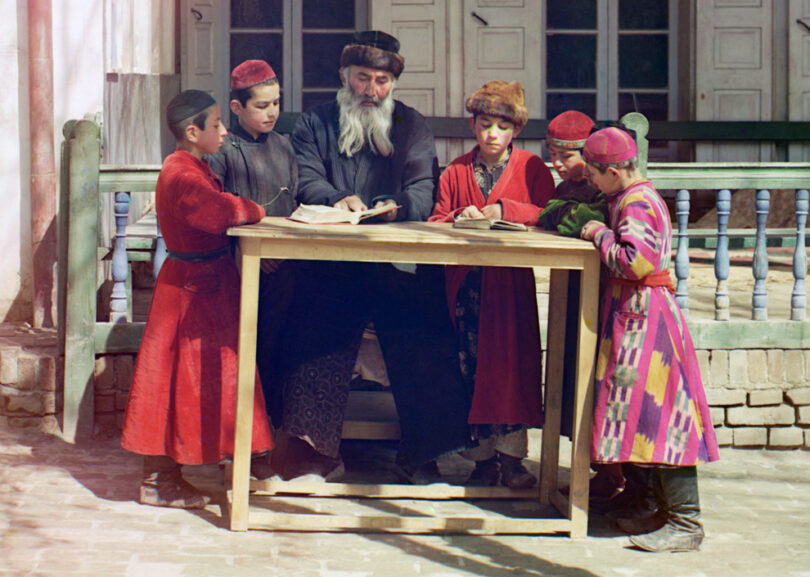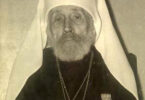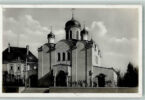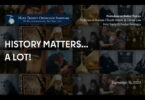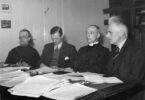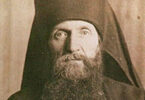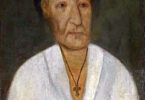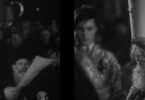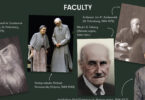This paper below, presented at the international conference on Metropolitan Anthony Khrapovitsky, which took place at the Holy Trinity Orthodox Seminary in Jordanville in 2006 attempts to look at the life and times of the future First Hierarch of ROCOR without resorting to polemics. The paper was published in the conference proceedings Metropolitan Antonii (Khrapovitskii): Archpastor of the Russian Diaspora, Vladimir Tsurikov, ed. (Jordanville, 2014).
In much of the Russian empire, Orthodox Christian thinkers at the turn of the twentieth century had a complicated relation to Jews and Judaism. While all adherents of minority religions, particularly Old Believers and Uniates faced legal limitations, the situation of the Jews was unique[1]For a discussion of the different imperial policies towards religious minorities, see Robert Geraci and Michael Khodorkovsky, eds. Of Religion and Empire: Missions, Conversion, and Tolerance in … Continue reading. On the one hand, in the political and geopolitical context, only the Jews were limited as to where they might live – mostly in the Pale of Settlement. Contemporary politics played a role as well. While the Russification policies of Alexander III and Nicholas II had alienated most religious and national minorities, by 1900 only the Jews occupied key roles in the revolutionary movement, and particularly in revolutionary terrorism[2] For the disproportionately high number of Jews in revolutionary terrorism, see Anna Geifman, Thou Shalt Kill: Revolutionary Terrorism in Russia, 1894-1917 (Princeton U Press, 1993), pp. 32-35. .
Independently of politics, there was the specifically religious context. This, too, had two aspects. Church fathers taught that Jews had been the chosen people and the ancestors both of the Savior and the Christians. Orthodox liturgical texts reflected this message of continuity, with numerous quotations from the psalms, and paremii readings on the eves of Great Feasts emphasizing their Old Testament prototypes and foreshadowings. On the other hand, they also taught that it was the Jewish elders who had prompted Pontius Pilate to sentence Jesus Christ to the crucifixion and who had continued to deny that He was indeed the Messiah. Centuries of Christian theology had grappled with those contradictions. It was easy to argue that Christians were the New Israel. But what did this imply for how governments led by Christian monarchs should treat the Jews in their kingdoms? And how concretely did it imply that Christians ought to treat the Jews in their midst?
For most of the seventeenth and eighteenth centuries in Russia, this was largely a non-issue. It was a non-issue simply because in those years there were virtually no Jews in Russia at all. Only at the end of the 18th century, with the partitions of Poland and the absorption of its population, did the Russian imperial government have to work out policies regarding Jews (and, for that matter, Roman Catholics). And under the influence of Napoleon and Romanticism, all nineteenth-century Europe experienced a wave of nationalism emphasizing the unique qualities of each nation and each people. Thus, ironically, the Russian empire acquired its Jewish population precisely at a time when Russian intellectuals began to explore what it meant to be Russian, and what set Russians apart from everyone else.
The Slavophiles are the best example of this tendency. All of them held some beliefs in common. These included the uniqueness of both Orthodoxy and the Russian way of life, a negative opinion of Peter I and his religious innovations, and sympathy for Russian peasants. But, despite these similarities, there were also crucial differences of emphasis. Particularly for such ‘second-generation’ Slavophiles as Konstantin Leontiev, Katkov, and Pobedonostsev, the essential point was Russia and Russianness, with the autocracy a close second (or vice versa). For such Slavophiles as Aleksei S. Khomiakov, Ivan Kireevskii, and Fedor Dostoevskii, however, the essential issue was not Russia or being Russian as such. To them, being Russian was important only insofar as one was Orthodox; Russia’s own value lay only in its devotion to Orthodoxy.
I mention this background to stress that when Metropolitan Antonii Khrapovitskii was forming his own opinions, the centrality of Orthodoxy to Russia was part of public discourse and debated and resolved in various ways. And it was Metropolitan Antonii who played a key role in forming this discourse.
There are two reasons for this. First, Metropolitan Antonii was a charismatic and controversial figure, described as ‘one of the most gifted and influential church leaders of the twentieth century’[3] Pal Kosto, ‘A Mass for a Heretic? The Controversy over Lev Tolstoi’s Burial.’ Slavic Review 60, №1 (Spring 2001): 75-95. . He had a typically wide-ranging career for a Synodal bishop, as an alumnus of the St Petersburg Theological Academy, and later rector of the theological academies in both Moscow and Kazan. Second, it fell to Metropolitan Antonii to be assigned the bishopric of Volyn’ in the crucial years of 1902-1914 (discussed in this volume at greater length by Sophia Senyk). As well as being the center of many former Uniates, Volhynia also part of the historical Pale of Settlement, with a correspondingly high Jewish population. Thus, Metropolitan Antonii’s role as a bishop of a flock in a confessionally diverse area brought him into closer contact with Jews and their problems than it did when he was, say, the bishop of Ufa. Thus, his comments are more relevant than those of bishops whose bishoprics were in areas where the Orthodox dominated, or which were almost exclusively Orthodox.
It is not enough to say simply that the area was confessionally diverse. From the late sixteenth century onwards, Polish magnates had invited Jews to settle in Ukrainian towns and on their estates. This relationship was complex at best. On the one hand, there was inevitable and routine day-to-day interaction. On the other hand, there was religious antagonism on both sides. The Orthodox Christian peasantry also resented the Jews for their role in Polish economic domination of the region, particularly the arenda leaseholding system[4] Howard Aster and Peter J. Potichnyi. Jewish Ukrainian Relations: Two Solitudes (Oakville, Ont., 1983). . In fact, there is a little better example of this resentment than the original design for the statue of Bohdan Hmel’nyts’kyi in Kiev, showing the Cossack’s horse crushing both a Polish noble and a Jewish arendator[5] John D. Klier. “Kievlianin and the Jews: A Decade of Disillusionment, 1864-1873.” Harvard Ukrainian Studies 5, №1 (1982): 86-87, quoted in Natan M. Meir. “Jews, Ukrainians, and Russians in … Continue reading.
The political context is also important. The Great Reforms of Alexander II had been a relative Golden Age both for Jews and for the empire’s other national minorities. After the assassination of Alexander II in 1881, the Russian state introduced much more repressive policies[6] See John D. Klier. Imperial Russia’s Jewish Question, 1855-1881 (Cambridge: Harvard University Press, 1995); Benjamin Nathans. Beyond the Pale: The Jewish Encounter with Late Imperial Russia … Continue reading. In all of the Russian empire, ever more non-Jews came to believe that Jews represented a serious threat. But this was particularly the case in present-day Ukraine. After the Polish uprising of 1863 and the appearance of the Ukrainian nationalist movement, ever more Orthodox Christians in the borderlands who identified with Russia responded to these perceived threats by becoming more nationalistic. More than people in, say, Moscow, they felt that Russianness itself was under attack, and they had to defend it. It is not surprising that the Union of the Russian People (Soiuz russkago naroda) was active in both Kiev and in Volyn’: they saw themselves as defenders of Russianness.
Thus, Metropolitan Antonii arrived in Volyn’ when it was a powder-keg. Not surprisingly for someone who identified wholeheartedly with the Russian Orthodox tradition, Metropolitan Antonii immediately and energetically set about recovering and defending it. His first public sermon on Jewish-Russian tensions came on the occasion of the Kishinev pogrom in 1903. To appreciate his sermon’s effect, we need to bear in mind what a sensational event the pogrom was and how much coverage it received in the international press. Newspapers in New York, Paris, London, and Berlin – and those are only the capitals – covered the event on their front pages. For the first time, the Yiddish-language press in the Russian empire used photographs to illustrate the gruesome spectacle of dead bodies lying next to shattered shops. The exact number of the dead was nearly irrelevant: the point was that the Kishinev pogrom became international shorthand for mob violence and official anti-Semitism in the Russian empire[7] For representations of the pogrom, see Olga Litvak, ‘The Poet in Hell: H.N. Bialik and the Cultural Genealogy of the Kishinev Pogrom of 1903,’ Jewish Studies Quarterly 12:1 (2005): 101-128. . When we bear in mind the large wave of Jewish emigration from the Russian empire from the 1880s onward, particularly to New York, and when we bear in mind the Dreyfus affair in France, the unusually receptive moment becomes clear.
In this charged atmosphere, Metropolitan Antonii’s philo-Semitic sermon on the Sunday of the Myrrh-bearing Women in the Zhytomyr Cathedral on April 20, 1903, was a bombshell. He described the pogrom in gory detail and condemned it in even stronger terms. What mockery it was over the Savior, he exclaimed, when those who called themselves his followers viciously attacked his kin. He took this occasion to make clear how the Jewish nation remained dear to God’s Spirit and how anyone who hurt them offended Him.
And indeed, Metropolitan Antonii pointed out, look what an example contemporary pious Jews set. ‘See their devotion to their law, see how they keep the Sabbath, see how faithful they are to their wives, see how hard they work, see how they love their children, see their obedience. There was a time not so long ago when Christians surpassed them in all this, but in our dissolute and aimless age with what respect we ought to look at all these features of Jewish life in our cities, where most Christians do not distinguish feast day from fast day from ordinary day, constantly giving way to drunkenness and lechery and idleness.’
God’s fearful punishment, he continued, would meet all those villains who would spill the blood that was kin to the God-man, His Most-Pure Mother, the apostles, and the prophets. ‘Do not say that this blood was sacred only in the past!’ he exclaimed to his audience. In the future, too, communion with the Divine essence awaited the Jews (2 Peter 1:4). Metropolitan Antonii quoted strong words: ‘All of Israel will be saved, as it is written: a Redeemer will come out of Sion and turn aside dishonor from Jacob: and this is my testament to them, when I will take their sins from them’ (XI, 25-27).
Not one people – not the Russians, not the Greeks – said Metropolitan Antonii could say that all their descendants would be saved in time, but it was said of the Jews. ‘So let the vicious residents of Kishinev know that they have destroyed future Christians still in the loins of contemporary Jews, that they were in short insolent foes of God’s Providence, tormenters of the people loved by God even after they had turned away from Him (XI, 28). God would not forgive the enemies of His people. Instead, Metropolitan Antonii urged the faithful of Kishinev to remember the righteous ancestors of today’s Jews: Abraham, Isaac, Jacob, Moses, and Joseph; David, Samuel, and Elijah, and the Maccabees.
It is a sign of how favorably the Jewish community responded that they immediately had it translated into Yiddish and began to distribute it, in both Yiddish and Russian versions, all over the empire. (In fact, they were so assiduous about distributing it that the governor-general warned that they were alienating the Orthodox population and that this might be counter-productive.)
This generally friendly and supportive attitude of Jews to Metropolitan Antonii soon changed, however. Two moments are key turning-points. To appreciate them fully, however, we need to bear in mind just when Metropolitan Antonii became seriously worried about the fate of the Russian empire. This was the context of the 1905 revolution.
For obvious reasons, most people attribute more importance to the revolutions of 1917. This is to forget completely how much more shocking 1905 seemed, however. February 1917, after all, happened after three years of war, and largely in St. Petersburg. But 1905 happened all over the empire, and it appeared as one shock after another.
What were the slogans of 1905? Equal rights for all religions, including the freedom to proselytize, a constitution and a representative form of government – no more autocracy. This sounded radical enough in St. Petersburg. But in Volyn’, for many Orthodox Christians, it sounded far too much like going back to minority status. More to the point: the goal of 1905 seemed to be to transform Russia into another largely secular European country, with separation of church and state.
It is not surprising that most Jews tended to support these goals, as they did in every European country. But just as many Roman Catholics after the French revolution resented what they saw as a loss of French identity, so many Orthodox saw the 1905 revolution as an epochal clash of civilizations and between two completely different versions of Russia: should it be Orthodox, led by an Orthodox monarch, and the only alternative to a modern, secular world dominated by capital – or should it be like every other European country? Finally, and perhaps most exciting, 1905 also opened the door for real political debate. This included the right-wing. For the first time, voices appeared which spoke not only for conservative landowners but also for Orthodox peasants, who wanted their Orthodox values to be the dominant ones – and who wanted to finally get hold of what they saw as their land.
All the country appeared to be out in the streets. The old way of life appeared to be hanging on a thread. And it was at this point that Metropolitan Antonii and other Orthodox clergy began to support the Union of the Russian People.
This is not the occasion to develop in detail the broad and fascinating significance of the many right-wing movements that arose at this time, whether the Union of the Russian People (Soiuz russkago naroda), the Union of Russian Men (Soiuz russkikh liudei), the Russian Gathering (Russkoe sobranie), and so on. It is enough to say that all were different attempts on the part of the political far-right to seize the challenge of the revolutionary movement. All the right-wing groupings had elements in common: they were founded to ‘promote Orthodoxy and autocracy, the rights of the state, and the distinctive features of the Russian people[8] Kievskoe russkoe sobranie, Otchet о sostojanii s dekabria 1911 goda po 1 janvaria 1914 goda (Kiev, 1914); quoted in Meir, p. 496. .’
With this agenda, it is not surprising that the clergy, particularly the clergy in present-day Ukraine, began to play a prominent in these movements. The role of such fiery monks as Iliodor in stirring up anti-Semitism is well-known. After a priest, Father G. Ia. Prozorov, became the Kiev Russian Gathering’s leader, Jews in the city began to associate Orthodox clergy with anti-Semitism. In 1905, for example, city authorities investigated claims it was the Kiev Caves Monastery which had printed proclamations calling for the beating of Jews and Poles[9] Khronika evreiskoi zhizni, №32 (17 August 1906), p. 24. .
Metropolitan Antonii’s home base, the Pochaev Lavra faced no such accusations, but it was an active center of Union activity[10] For a detailed examination of the role of both Metropolitan Antonii and the Pochaev Lavra in the Union, see Ricarda Vulpius, Nationalisierung der Religion: Russifizierungspolitik und ukrainische … Continue reading. When challenged on this point by Nicholas Berdiaev, Metropolitan Antonii responded heatedly:
‘…I spoke and printed a sermon against pogroms in 1903, thanks to which in Volynia there were no pogroms, although they flew round the whole south-western region; in 1905 on the sixth week of Great Lent Jews in Zhytomyr shot at portraits of the Sovereign and were beat up by local residents for this; the day before Palm Saturday I arrived from St Petersburg and on Passion Week delivered another speech against the pogrom which was being prepared for the first day of Easter. This pogrom never took place, and only after a popular police chief was killed by a Jewish hireling on the evening of Thomas Sunday did the fights with the Jews begin, who then [the Jews] said, “The government deliberately summoned our archbishop to Petersburg, because as long as he is in town, no one hurts us”; in 1907 I published first in the newspaper and then as a separate brochure ‘The Jewish Question and the Holy Bible,’ which I am now re-publishing in Yiddish. All this, however, does not keep the liberals from printing about me that I am going around with church processions to incite pogroms. Incidentally, all pogroms stopped in Volynia from the time when the Pochaev Union of the Russian People was formed in 1906.’
Metropolitan Antonii went on to defend the Union as ‘the only institution in all of Russia which is purely popular, muzhitskoe, democratic.’ He asked Berdiaev rhetorically:
‘…What drew Father Ioann of Kronstadt to this Union? You mention holy Seraphim of Sarov, and Peter Struve mentioned St Filipp and Nil Sorskii. Tell me frankly: do you really doubt that all of them would be on the side of the Russian Union if they lived in our day? For all of them had confessional and monarchical views; all of them jealously protected the people from foreigners and those of other faiths. What about patriarch Ermogen? What about Avraami Palitsyn, Dionisii? For that matter, where do we get the name ‘black hundreds’ if not from the defenders of the Trinity Sergius Lavra, who were so dubbed by the Poles in 1612?’
What, asked Metropohtan Antonii, did Archimandrite Vitaly Maximenko, as the head of the Union in Pochaev – the very heart of Volyn’ in Western Ukraine – actually do?
In 1906 he denounced the revolutionaries and restrained the people from arson; in 1907 he bought up bread in Siberia for starving Volynia and by doing so forced the merchants not only to stop their astronomically driving up prices for rye but even to lower prices by 18 kopecks a pound, in 1908 he took up resettlement activity, finding land for Union members around the Baikal and the Amur, earlier yet he set up legal consultation in Pochaev, temperance societies and so on.
The Union, according to Metropolitan Antonii, in short, was the only union in Rus’ (his use of the word is key) of mutual aid – moral aid, legal, economic – for the ‘silent majority’ – the Orthodox peasantry. He did admit that the Union was against equal rights for members of all religions. But he argued that this had nothing to do with antipathy for Jews as such. Instead, he pointed out that in general in Russia rights were not divided equally (‘Noblemen have one kind of rights, merchants another, peasants a third; those with master’s degrees have one kind of rights, bachelors another, cadets a third, seminarians a fourth; Russians have some rights, Tatars others, Jews a third’). In short, for once echoing Pobedonostsev, he argued that the Union existed not because it hated anyone, but because it wished to defend the poor Orthodox peasants and to give them a level playing field – that it advocated a kind of affirmative action, but (in Ukraine at least) for the historically persecuted Orthodox majority[11] Response to N.A. Berdiaev on ‘Vekhi,’ in Moskovskii ezhenedel’nik, August 1909, №32, and Polnoe Sobranie Sochinenii, vol. 3, p. 554, quoted in Nikon (Rklitskii), Archbishop, Mitropolit … Continue reading.
Thus, to Metropolitan Antonii, the Union of the Russian People was a defensive, not an offensive organization; it was a fierce attempt to privilege a vision of Orthodox Christianity that was struggling for its life. And, with the support of the peasants, it really had a chance. But, to state the obvious, in no way could someone who supported the Union be construed as someone who was sympathetic to an essentially secular Russia where Roman Catholics could proselytize freely, along with all other religions, and where Jews would have equal rights.
Support for the Union, then, was Metropolitan Antonii’s first step in alienating Jewish opinion. The second, and more decisive one, came when Metropolitan Antonii allowed himself to respond to a journalist’s question about ritual murder. Both these moments show what the litmus tests were for Jews in the Russian empire to decide whether someone was friend or foe. From this point of view, Metropolitan Antonii, whatever his love for historic Judaism, failed both tests.
The charge of ritual murder, also known as ‘blood accusation,’ has a long history. Nearly every European country, from England to Poland to Germany, has its own Christian ‘martyrs,’ usually children, to Jewish atrocity. William of Norwich, who was killed in 1144, is only the first European example[12] For the Life of St William of Norwich, see Thomas Head, ed., Medieval Hagiography (New York and London: Routledge, 2000), pp. 515-536. For the earliest version of the blood libel I have come … Continue reading. Interestingly, however – as emerged only in the 19th century – is that Russia does not have its own indigenous tradition of what Jews call ‘the blood libel.’ Indeed, it is to the credit of Orthodoxy, the defense attorney in the Beilis case pointed out, that not a single Orthodox cleric could be found to testify on the previous history of ritual murder: the only expert witness was a Polish Catholic priest[13] See the reprint of the extremely rare stenographic account of the Beilis case: Stenograficheskii otchet Kievskogo sudebnogo protsessa (Moscow: Russkaia ideia, 2006). . If one looks up the subject heading ‘blood accusation’ in the Library of Congress, there are almost no such headings for Russia; almost all come from Poland, Germany, Bohemia, or England. (Ukrainians, of course, were acquainted with the notion from their long years in the Polish-Lithuanian commonwealth.) In Russia, ironically, anti-Semitism was not a local product, but something imported from Europe along with the other attributes of modernity, as Laura Engelstein has argued[14] Laura Engelstein, for example, makes the argument that Sergei Nilus’s positions are derived from European sources. See her ‘Holy Russia in Modern Times: An Essay on Orthodoxy and Cultural … Continue reading.
The Beilis case of 1911-1913, when Mendel Beilis was tried for the ritual murder of Andrei Iushchinskii, a Christian boy, thus marked a turning point. That case was the first of its kind in the Russian empire. It came after a wave of nineteenth-century translations into Russian of such accusations in other languages. (Even Vladimir Dal’ was reputed to have devoted a volume to the subject, although its authenticity has been called into question[15] Vladimir I. Dal’, Rozyskanie о ubienii evreiami khristianskikh mladentsev (1844), repr. as Zapiska о ritual’nykh ubiistvakh (Moscow: Vitiaz’, 1995). But see Iulii Gessen, “Zapiska о … Continue reading.) Ironically, then, just as Slavophilism emerged out of a general wave of European Romanticism, so did Russian anti-Semitism emerge out of a wave of European publications on the subject, and their translation into Russian. Russia now had the dubious distinction of being part of a general European tendency to reflect social anxieties about tradition and modernity in high-profile trials with Jews at the center[16] Albert S. Lindemann, The Jew Accused: Three Anti-Semitic Affairs (Dreyfus, Beilis, Frank), 1894-1915 (Cambridge: Cambridge University Press, 1991). For more focused studies of the Beilis case, see … Continue reading. What was Metropolitan Antonii’s position? On the Beilis case, he appears to have made no public comment. On the broader issue, the evidence is contradictory.
The frescoes of Pochaev include a depiction of Gavriil of Bielostok, a supposed late 17th-century victim of Jewish killers, although it is not clear when it dates from. Although Gavriil was killed in 1690, it is not clear when he became considered a martyr or canonized; the only liturgical reference to him I have been able to find dates from 1908. But, according to well-known church expert Kartashev, on April 20, 1912, Metropolitan Antonii not only participated in a memorial service for ‘the infant Gavriil, tortured by the Jews,’ but himself wrote the liturgical texts, including the troparion, kontakion, and special additional prayers[17] See the extensive quotation from Russkoe Slovo in Kievskaia mysl’ №277 (7 October 1913), p. 1. For the text of the service, see Sluzhba sviatomu mucheniku Gavriilu mladentsu, v lieto godine … Continue reading.
I have not yet been able to determine whether the claim is true. Here, we will discuss only what Metropolitan Antonii himself acknowledged. When the issue of ritual murder came up in 1905, and he was interviewed on the subject by a small newspaper in Zhytomyr, he said that given the punishment meted out to Saul and his descendants in the book of Kings, some current variant might exist. He added that if it existed, it should not be regarded as a disgusting relic of the past, but a political tactic for maintaining the nation’s purity. Finally, and perhaps most sensationally, he added that whether or not ritual murder existed, that was not what Christians ought to be worrying about: the loss of one youth or infant out of the 200 million population of Russia, bad though that would be, would still be far less evil than the general demoralization the Jews were spreading in Christian society.
This, Metropolitan Antonii himself later acknowledged, was the turning point. He had crossed the Rubicon. For Jews at the beginning of the twentieth century, the ‘blood libel’ was probably the most sensitive possible point, the ‘dealbreaker’ which separated friend from foe. Metropolitan Antonii had touched that point, and he paid the price. His image among Jews never recovered[18] See Metropolitan Antonii’s account of this episode in his ‘Po povodu knigi I.A. Rodionova,’ in Nikon (Rklitskii), Zhizneopisanie blazhennieishago Antoniia, mitropolita Kievskago i Galitskago, … Continue reading. Most Orthodox Christians, by contrast, paid little attention. To them, Metropolitan Antonii mattered for his championing of the causes they cared about: Orthodox spirituality, especially in the form of monasticism, devotion to church services anti-church art and architecture, and defending the peasant commune and peasant values generally. To this one might restore the patriarchate and maintaining warm relations with Orthodox Christians of other nationalities.
However, Metropolitan Antonii, true to form, continued to publish on the only aspect of Judaism that truly interested him – its historical role in the light of Scripture. In 1907, he published ‘The Jewish Question and the Holy Bible’ (which, like the Kishinev sermon, was also translated into Yiddish). In it, he pondered the fate of Jews once they had achieved political freedom. Consider the Jews of France, with their equal rights: now that they had successfully assimilated, what was left of their previous morals, language, conscience, even the desire to call themselves Jews? Not a jot. In effect, they had destroyed themselves in a way that neither Pharaoh, nor Nebuchadnezzar, nor Adrian, nor Bohdan Khmelnitsky had been able to. That, concluded Metropolitan Antonii, is what it means to pursue this-worldly boons through criminal means without the will of God.
He went on to examine the various liberation movements that Jews had led – out of Babylonian captivity, the uprising against the Romans after Christ’s Resurrection, the liberation from Egypt, and the Maccabees. In all those cases, he noted, God did not will His people to pursue property and political rights: he saved them only when they were being kept from fulfilling the law of Moses, and saved them only through the consent of the kings who ruled them he saved them not for riches or satisfaction, but for the harsh rigors of piety. In fact, he claimed, there were no pogroms in Russia as long as there were no Jewish atheists: the pogroms started only 25 years ago, ‘when the Jewish nihilist type appeared, who would always bring hatred of others upon the Jewish people.
…
In the emigration, in a far different political context than that of the Russian empire, Metropolitan Antonii had other concerns and published little on the subject of either historical or contemporary Judaism. When asked to review such books as A. Ia. Bromberg’s ‘The West, Russia, and the Jews, or I.A. Rodionov’s ‘The Sons of the Devil’ (Belgrade, 1932), he maintained the dual approach that had characterized all his writing – on the one hand, a genuine love for historic Judaism and its traditional values; on the other a genuine belief that some modern Jews, through their support of the revolutionary movement, had helped to destroy all he loved in the Russian empire. He admired and defended the former, and was not shy about denouncing the latter.
But, for that matter, Metropolitan Antonii felt the same way about Russians: all that was good and true in them came from their adherence to Orthodoxy. Take away traditional religion, add revolution, and all nations – whether Russians, or Jews, or Bulgarians, or Ukrainians, or anyone else – fell into the dismal category of all who supported atheism and modernity.
From this point of view, Metropolitan Antonii remained consistent. In every piece he published, he defended and celebrated traditional Judaism even as he condemned all who took part in the revolutionary movement. But his abiding belief in Scripture prompted Metropolitan Antonii to make an exception for one nation alone. Alone of all the groups who took part in the Russian revolutions, he continued to believe that the Jews would be the only ones who might yet be saved as a nation.
His last words on the subject were: ‘I was never and will never be an enemy of the Jewish nation, but always regarded traditional, patriarchal Jews with profound sympathy and respect. And I do not lose hope that the words of the Apostle Paul will yet be visited upon sbudetsia upon them: that “someday all of Israel will be saved,” when “a Redeemer shall come out of Zion and shall turn aside unrighteousness from Jacob”.’ (Isaiah 27:9, 59:20-21, comp. Romans 11:26-27).
References
| ↵1 | For a discussion of the different imperial policies towards religious minorities, see Robert Geraci and Michael Khodorkovsky, eds. Of Religion and Empire: Missions, Conversion, and Tolerance in Tsarist Russia (Cornell U Press, 2001). See in particular John D. Klier, ’State Policies and the Conversion of Jews in Imperial Russia,’ pp. 92-114. |
|---|---|
| ↵2 | For the disproportionately high number of Jews in revolutionary terrorism, see Anna Geifman, Thou Shalt Kill: Revolutionary Terrorism in Russia, 1894-1917 (Princeton U Press, 1993), pp. 32-35. |
| ↵3 | Pal Kosto, ‘A Mass for a Heretic? The Controversy over Lev Tolstoi’s Burial.’ Slavic Review 60, №1 (Spring 2001): 75-95. |
| ↵4 | Howard Aster and Peter J. Potichnyi. Jewish Ukrainian Relations: Two Solitudes (Oakville, Ont., 1983). |
| ↵5 | John D. Klier. “Kievlianin and the Jews: A Decade of Disillusionment, 1864-1873.” Harvard Ukrainian Studies 5, №1 (1982): 86-87, quoted in Natan M. Meir. “Jews, Ukrainians, and Russians in Kiev: Intergroup Relations in Late Imperial Associational Life,” Slavic Review 65, №3 (Fall 2006), р. 482. |
| ↵6 | See John D. Klier. Imperial Russia’s Jewish Question, 1855-1881 (Cambridge: Harvard University Press, 1995); Benjamin Nathans. Beyond the Pale: The Jewish Encounter with Late Imperial Russia (Berkeley: University of California Press, 2002); Hans Rogger. Jewish Policies and Right-Wing Politics in Imperial Russia (Berkeley: University of California Press, 1986). |
| ↵7 | For representations of the pogrom, see Olga Litvak, ‘The Poet in Hell: H.N. Bialik and the Cultural Genealogy of the Kishinev Pogrom of 1903,’ Jewish Studies Quarterly 12:1 (2005): 101-128. |
| ↵8 | Kievskoe russkoe sobranie, Otchet о sostojanii s dekabria 1911 goda po 1 janvaria 1914 goda (Kiev, 1914); quoted in Meir, p. 496. |
| ↵9 | Khronika evreiskoi zhizni, №32 (17 August 1906), p. 24. |
| ↵10 | For a detailed examination of the role of both Metropolitan Antonii and the Pochaev Lavra in the Union, see Ricarda Vulpius, Nationalisierung der Religion: Russifizierungspolitik und ukrainische Nationsbildung 1860-1920 (Wiesbaden: Harrassowitz Verlag, 2005, especially pp. 213-240 (Politische Ausdrucksformen der russischen Identitatskonzeption). |
| ↵11 | Response to N.A. Berdiaev on ‘Vekhi,’ in Moskovskii ezhenedel’nik, August 1909, №32, and Polnoe Sobranie Sochinenii, vol. 3, p. 554, quoted in Nikon (Rklitskii), Archbishop, Mitropolit Antonii (Khrapovitskii) i ego vremia, kn. 1 (Nizhnii Novgorod: izd. Bratstva vo imia sv. kniazia Aleksandra Nevskogo, 2003), pp. 514-520. |
| ↵12 | For the Life of St William of Norwich, see Thomas Head, ed., Medieval Hagiography (New York and London: Routledge, 2000), pp. 515-536. For the earliest version of the blood libel I have come across, see Socrates Scholasticus, ‘The Jews Commit Another Outrage upon the Christians are Punished,’ Ecclesiastical History, Bk. VI: Chapter 16, in the Internet Medieval Source Book. For studies of Jewish-Christian relations in the Middle Ages, see Kenneth Stow, Alienated Minority: The Jews of Medieval Latin Europe (Cambridge: Harvard University Press, 1992). For a recent, highly controversial, study of blood libel, see Ariel Toaff, Pasque di sangue: ebrei d’Europa e omicidi rituali (Bologna: Il Mulino, 2007). |
| ↵13 | See the reprint of the extremely rare stenographic account of the Beilis case: Stenograficheskii otchet Kievskogo sudebnogo protsessa (Moscow: Russkaia ideia, 2006). |
| ↵14 | Laura Engelstein, for example, makes the argument that Sergei Nilus’s positions are derived from European sources. See her ‘Holy Russia in Modern Times: An Essay on Orthodoxy and Cultural Change.’ Past and Present, 2001, 173: 129-156. |
| ↵15 | Vladimir I. Dal’, Rozyskanie о ubienii evreiami khristianskikh mladentsev (1844), repr. as Zapiska о ritual’nykh ubiistvakh (Moscow: Vitiaz’, 1995). But see Iulii Gessen, “Zapiska о ritual’nykh ubiistvakh” (pripisyvaemaia V.I. Daliu) i eia istochniki (St. Petersburg: tip. L A. Ganzburga, 1914). |
| ↵16 | Albert S. Lindemann, The Jew Accused: Three Anti-Semitic Affairs (Dreyfus, Beilis, Frank), 1894-1915 (Cambridge: Cambridge University Press, 1991). For more focused studies of the Beilis case, see Harriet Murav, ‘The Beilis Ritual Murder Trial and the Culture of Apocalypse,’ Cardozo Studies in Law and Literature, vol. 12, №2 (Autumn-Winter 2000), pp. 243-263, and the still valuable Hans Rogger, ‘The Beilis Case: Anti-Semitism and Politics in the Reign of Nicholas II,’ Slavic Review, vol. 25, №4 (December 1966), pp. 615-629. |
| ↵17 | See the extensive quotation from Russkoe Slovo in Kievskaia mysl’ №277 (7 October 1913), p. 1. For the text of the service, see Sluzhba sviatomu mucheniku Gavriilu mladentsu, v lieto godine 1690 ot iudei umuchennomu v Bielostotsie gradie: egozhe netlennve moshchti vo grade Slutsie dodnes’ pochivaiut (Pochaev: tip. Pochaevskoi Uspenskoi Lavry, 1908) (no author is given). For a Soviet-era denunciation of the cult, see Sviatoi otrok Gavriil: srednevekovaia beilisiada (Moscow: Ateist, 1920?). |
| ↵18 | See Metropolitan Antonii’s account of this episode in his ‘Po povodu knigi I.A. Rodionova,’ in Nikon (Rklitskii), Zhizneopisanie blazhennieishago Antoniia, mitropolita Kievskago i Galitskago, t. X (New York: izd. Severo-Amerikanskoi i Kanadskoi eparkhii, 1963), pp. 169-171. I have not yet been able to locate published Jewish responses to this piece. |

